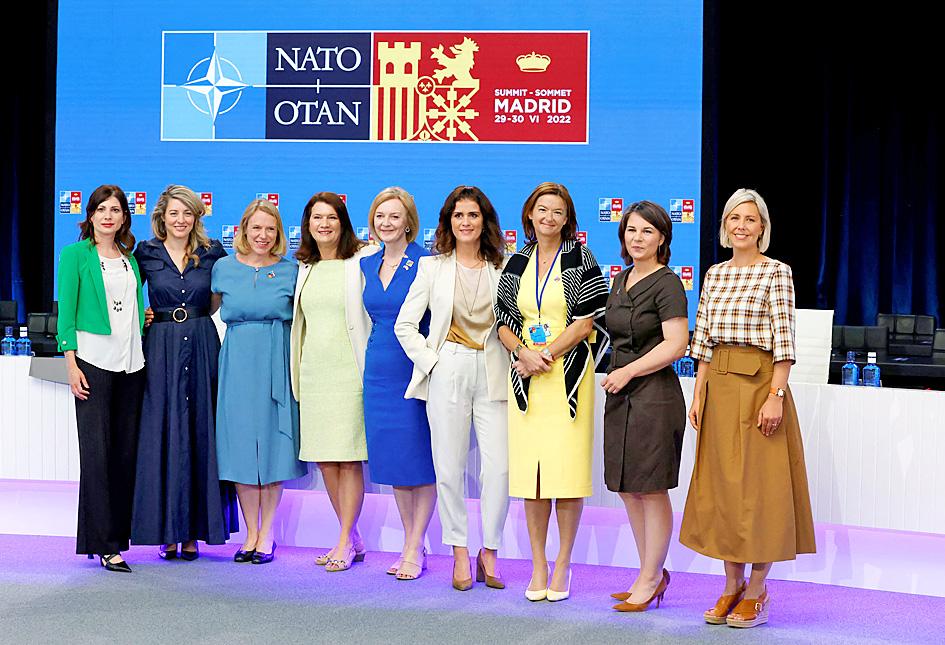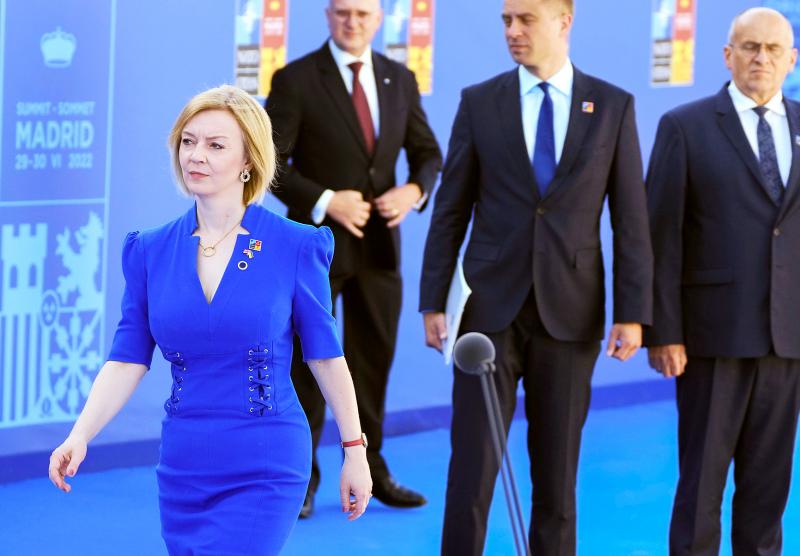China would be making “a catastrophic miscalculation” if it invaded Taiwan, British Secretary of State for Foreign, Commonwealth and Development Affairs Liz Truss said yesterday, telling a NATO summit that the UK and other countries should reconsider trading relationships with countries that use economic power in “coercive” ways.
In a sign of how far UK government attitudes toward China have shifted since the self-declared “golden decade” under former British prime minister David Cameron, Truss said trade should be directed at countries that could be trusted.
Speaking at the Madrid summit, Truss said that with China expanding its strategic ambitions, NATO’s new strategic concept should reference China specifically.

Photo: Reuters
The alliance’s core mission was last updated in 2010 and is due to be revised.
Truss’ comments came a day after she called for more rapid action to help Taiwan with defensive weapons in case Beijing invaded, saying that was a key lesson from the Russian invasion of Ukraine.
“I do think that with China extending its influence through economic coercion and building a capable military, there is a real risk that they draw the wrong idea that results in a catastrophic miscalculation such as invading Taiwan,” Truss said, speaking alongside Australian Prime Minister Anthony Albanese and Belgian Prime Minister Alexander De Croo.

Photo: AP
One of the areas addressed by the G7 summit in southern Germany, which ended earlier this week, was efforts to offer more Western infrastructure money for developing nations, a response to China’s Belt and Road Initiative that seeks to bring influence through similar investment.
Given the threat from both China and Russia, there is a “need to reach outward and create that network of liberty of fellow like-minded countries,” Truss said.
G7 countries such as Australia should use their “economic weight” to challenge China, she said, adding that countries such as the UK could even rethink their approach to trade with Beijing.
“I think historically we haven’t used that economic power,” she said.
“We’ve been equidistant, if you like, about who we trade with, who we work with. And I think countries are becoming much more focused now on, is this trade with trust, do we trust this partner? Are they going to use it to undermine us, or are they going to use it for the mutual benefit of both of our economies? So trade has got a lot more geopolitical,” she added.
Speaking on Tuesday before the UK House of Commons’ Foreign Affairs Committee, Truss went notably beyond the standard government language on Taiwan by saying there was a need to provide it with defensive weapons.
“We should have done things earlier. We should have been supplying the defensive weapons into Ukraine earlier,” she said. “We need to learn that lesson for Taiwan. Every piece of equipment we have sent takes months of training, so the sooner we do it, the better.”

MAKING WAVES: China’s maritime militia could become a nontraditional threat in war, clogging up shipping lanes to prevent US or Japanese intervention, a report said About 1,900 Chinese ships flying flags of convenience and fishing vessels that participated in China’s military exercises around Taiwan last month and in January last year have been listed for monitoring, Coast Guard Administration (CGA) Deputy Director-General Hsieh Ching-chin (謝慶欽) said yesterday. Following amendments to the Commercial Port Act (商港法) and the Law of Ships (船舶法) last month, the CGA can designate possible berthing areas or deny ports of call for vessels suspected of loitering around areas where undersea cables can be accessed, Oceans Affairs Council Minister Kuan Bi-ling (管碧玲) said. The list of suspected ships, originally 300, had risen to about

DAREDEVIL: Honnold said it had always been a dream of his to climb Taipei 101, while a Netflix producer said the skyscraper was ‘a real icon of this country’ US climber Alex Honnold yesterday took on Taiwan’s tallest building, becoming the first person to scale Taipei 101 without a rope, harness or safety net. Hundreds of spectators gathered at the base of the 101-story skyscraper to watch Honnold, 40, embark on his daredevil feat, which was also broadcast live on Netflix. Dressed in a red T-shirt and yellow custom-made climbing shoes, Honnold swiftly moved up the southeast face of the glass and steel building. At one point, he stepped onto a platform midway up to wave down at fans and onlookers who were taking photos. People watching from inside

Japan’s strategic alliance with the US would collapse if Tokyo were to turn away from a conflict in Taiwan, Japanese Prime Minister Sanae Takaichi said yesterday, but distanced herself from previous comments that suggested a possible military response in such an event. Takaichi expressed her latest views on a nationally broadcast TV program late on Monday, where an opposition party leader criticized her for igniting tensions with China with the earlier remarks. Ties between Japan and China have sunk to the worst level in years after Takaichi said in November that a hypothetical Chinese attack on Taiwan could bring about a Japanese

The WHO ignored early COVID-19 warnings from Taiwan, US Deputy Secretary of Health and Human Services Jim O’Neill said on Friday, as part of justification for Washington withdrawing from the global health body. US Secretary of State Marco Rubio on Thursday said that the US was pulling out of the UN agency, as it failed to fulfill its responsibilities during the COVID-19 pandemic. The WHO “ignored early COVID warnings from Taiwan in 2019 by pretending Taiwan did not exist, O’Neill wrote on X on Friday, Taiwan time. “It ignored rigorous science and promoted lockdowns.” The US will “continue international coordination on infectious